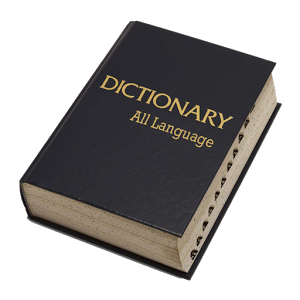Dangers of (starting with) definitions – how to teach vocabulary
 We know that learning vocabulary is critical in helping students to read and understand science. It therefore makes perfect sense that if we want to teach our students about osmosis,then we should start with defining important vocabulary. We should start with a definition.
We know that learning vocabulary is critical in helping students to read and understand science. It therefore makes perfect sense that if we want to teach our students about osmosis,then we should start with defining important vocabulary. We should start with a definition.
Teacher: “Good morning class, today we are going to learn about osmosis. Please copy down the definition from the board. Osmosis is the net movement of water molecules from an area of high water concentration to an area of low water concentration through a selectively permeable membrane.” Johnny, what’s osmosis?
Johnny: “Osmosis is the net movement of water molecules from an area of high water concentration to an area of low water concentration through a selectively permeable membrane.”
Teacher: “Excellent! Well done Johnny.”
And stop.
Why are definitions dangerous?
Definitions used in this way are dangerous – let me try and explain why. From the perspective of the expert i.e. the teacher, they are useful. They are useful because they make sense. The teacher understands the concepts of molecules, net movement, concentration and membranes. But this is not the case for the students. For them, the definition is an incredibly abstract starting point- they are defining words that for the most part, cannot be seen and do not relate to their pre-existing knowledge – these words are unfamiliar.
Let’s try some other examples and see if they help you?
A plesiomorphy refers to the ancestral trait state, usually in reference to a derived trait state. A symplesiomorphic trait is also shared with other taxa that have an earlier last common ancestor with the taxa under consideration
Crore (noun) indian ten million; one hundred lakhs, especially of rupees, units of measurement, or people.
Were these definitions helpful? Well, I suppose only if the context and words used in the meanings are familiar and understood. If you studied evolutionary biology or travelled to India then the definitions are useful. It sounds an obvious point, but I think we all need reminding that glossaries and definitions are useful, but only if students can understand the context and terms used. This is unlikely to be the case though when definitions are used as the starting point. MFL is probably an exception, as meanings are generally familiar e.g. boulangerie (= magasin) bakery
, baker’s.
Helping students understand new words
How then can we help our students to understand new words for the first time? The answer is not to simply chant out definitions. Of course there is a role for choral response, but we must never make the assumption that chanting a definition equals understanding it. We need to be much more skeptical!
Below are a few techniques that are useful for teaching new words.
- Show pictures of key words e.g. a picture of fans leaving a stadium shows net movement nicely
- Act out key terms – I used to smash the metal filing cabinet to demonstrate sonorous and bent a paper clip to show malleable – simple but effective.
- Ask students to draw what the word means. This will give you a huge amount of feedback as to whether they understand the term or not. MWBs would work well here.
- e.g. draw a picture to represent the term selectively permeable
- Ask students to identify errors in definitions and then correct them.
- e.g. osmosis is the net movement of glucose becomes osmosis is the net movement of water molecules (through a selectively permeable membrane).
- Ask students to replace certain words with synonyms
- e.g.osmosis is the net movement of water molecules becomes osmosis is the overall
- movement of water molecules.
- Model the use of the words in different examples.
- The Science Penguin has produced a fantastic resource to teach key words through small group hands-on examples of the vocabulary terms.
Definitions: most useful for experts
So, definitions are most useful for experts who have forgotten and are least useful for novices who are learning. And yes, there is a time for students to learn definitions in science – but make sure they understand the defining statements, otherwise meaning will not be made.
